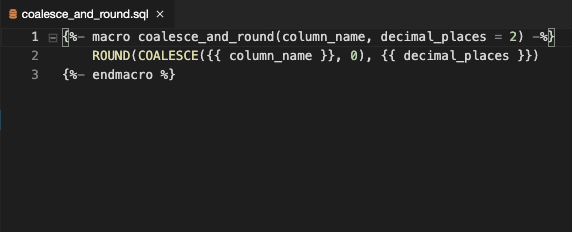Complex usage of jinja with dbt
Case Study: Building E-Commerce Data Models with dbt

Susan Sun
Freelance Data Scientist
Jinja statement: loop
Jinja statements are enclosed in {% %}:
- Looping through items
- Template:
{% for ... %} ... {% endfor %} - Example:
{% for order_status in order_statuses %} SUM( CASE WHEN status = '{{ order_status }}' THEN order_id END) {% endfor %}
- Template:
Jinja statement: loop
Repeating SQL:
SELECT
user_id,
SUM(CASE WHEN status = 'Shipped' THEN 1 ELSE 0 END)
AS num_orders_Shipped,
SUM(CASE WHEN status = 'Complete' THEN 1 ELSE 0 END)
AS num_orders_Complete,
SUM(CASE WHEN status = 'Processing' THEN 1 ELSE 0 END)
AS num_orders_Processing,
FROM {{ ref('stg_looker__orders') }}
GROUP BY 1
Jinja statement: loop
{% set order_statuses = ['Shipped', 'Complete', 'Processing'] %}
SELECT
user_id,
-- Jinja loop
{% for order_status in order_statuses %}
SUM(CASE WHEN status = '{{ order_status }}' THEN 1 ELSE 0 END)
-- Parametrized column name
AS num_orders_{{ order_status }}
{% endfor %}
FROM {{ ref('stg_looker__orders') }}
GROUP BY 1
Jinja statement: loop
dbt compile output:
SELECT
user_id,
SUM(CASE WHEN status = 'Shipped' THEN 1 ELSE 0 END)
AS num_orders_Shipped,
SUM(CASE WHEN status = 'Complete' THEN 1 ELSE 0 END)
AS num_orders_Complete,
SUM(CASE WHEN status = 'Processing' THEN 1 ELSE 0 END)
AS num_orders_Processing,
FROM "dbt"."main"."stg_looker__orders"
GROUP BY 1
Jinja statement: macros
A Jinja macro:
- Is a function, written in Jinja
- Is reusable
- Is stored in the
/macrosfolder
COALESCE():
- returns the first non-null value
- syntax:
COALESCE(value1, value2, ...) - e.g.
COALESCE(nickname, first_name)
An example of a macro function:

Jinja statement: macros
Jinja statements are enclosed in {% %}:
- A reusable macro function:
- Template:
{% macro ... %} ... {% endmacro %} - Example:
{% macro coalesce_and_round(column_name, decimal_places = 2) %} ROUND(COALESCE({{ column_name }}, 0), {{ decimal_places }}) {% endmacro %}
- Template:
Jinja statement: macros
- Repeated SQL
ROUND(COALESCE(sales_amount, 0), 2) AS sales_amount, ROUND(COALESCE(cost_of_goods_sold, 0), 2) AS cost_of_goods_sold, - DRY (Don't Repeat Yourself)
- Create macro called
coalesce_and_round.sql - Store in
/macros - Invoke:
{{ coalesce_and_round('sales_amount', 2) }} AS sales_amount, {{ coalesce_and_round('cost_of_goods_sold', 2) }} AS cost_of_goods_sold,
- Create macro called
Managing Jinja whitespace
As written:
{% set traffic_source_values = ['Adwords', 'Email', 'Facebook'] %}
{% set browser_values = ['Chrome', 'Firefox', 'Safari', 'IE', 'Other'] %}
SELECT
user_id,
COUNT(DISTINCT session_id) AS num_web_sessions,
...
Managing Jinja whitespace
Compiled:
SELECT
user_id,
COUNT(DISTINCT session_id) AS num_web_sessions,
...
Managing Jinja whitespace
{%- ... %}strips the whitespace before.{% ... -%}strips the whitespace after.{%- ... -%}strips both.An example:
{%- set traffic_source_values = ['Adwords', 'Email', 'Facebook'] -%}
{%- set browser_values = ['Chrome', 'Firefox', 'Safari', 'IE', 'Other'] -%}
SELECT
user_id,
COUNT(DISTINCT session_id) AS num_web_sessions,
...
Let's practice!
Case Study: Building E-Commerce Data Models with dbt

